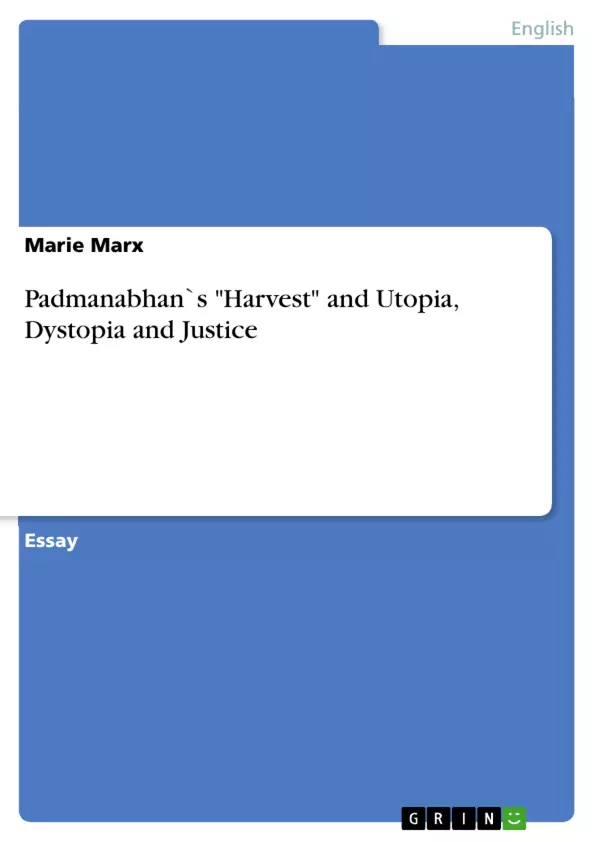This essay has two aims: to explain both utopian conceptions made by Jameson and to discuss in how far these aspects of utopia appear in the futuristic play “Harvest” by Manjula Padmanabhan. Supported by fictional political and social arrangements, Padmanabhan criticizes ‘roots of all evil’ like unemployment and up-to-date global trade relations between the Third World and the West in her play “Harvest”.
Fredric Jameson distinguishes in the essay “The Politics of Utopia” between two utopian perspectives: the 'root of all evil’ and ‘the political and social arrangements'. Jameson, born 1934, is considered to be one of the foremost contemporary Marxist literary and cultural critics writing in English.
In his article he says that ‘utopian’ has come to be a code word on the left for socialism or communism and on the right for ‘totalitarianism’. Both politics wish to change the system.
Table of Contents
- Fredric Jameson's Two Utopian Perspectives
- Political and Social Arrangements in “Harvest”
- The 'Root of All Evil' in “Harvest”
Objectives and Key Themes
This essay aims to explain Fredric Jameson's two utopian perspectives, namely the 'root of all evil' and 'the political and social arrangements', and to discuss how these aspects of utopia appear in Manjula Padmanabhan's futuristic play “Harvest”.
- Utopian perspectives: 'root of all evil' and 'political and social arrangements'
- Globalisation and capitalism in "Harvest"
- Exploitation of Third World countries by the West
- The commodification of human organs
- The loss of individual control and dignity
Chapter Summaries
- Fredric Jameson's essay "The Politics of Utopia" distinguishes between two utopian perspectives: the 'root of all evil' and 'the political and social arrangements'. The essay explores how these perspectives relate to the utopian concept of socialism or communism on the left, and totalitarianism on the right.
- Jameson's focus within the perspective of political and social arrangements is on daily life and how politics and society are organized. In “Harvest”, Padmanabhan presents a futuristic society where organ sales and transplants are commonplace, highlighting the ethical implications of this practice.
- The play “Harvest” also explores the 'root of all evil' perspective, particularly the role of unemployment and greed. Om, a young Indian man, sells his body parts to improve his family's living standard, highlighting the social and economic pressures that drive such decisions.
Keywords
The primary keywords and focus topics of this essay include: utopian perspectives, 'root of all evil', political and social arrangements, globalisation, capitalism, exploitation, commodification of organs, Third World, West, dystopian fiction, "Harvest", Fredric Jameson, Manjula Padmanabhan.
Frequently Asked Questions
What is the central theme of Manjula Padmanabhan's "Harvest"?
The play is a futuristic critique of global trade, focusing on the exploitation of the Third World through the commodification of human organs.
Which two utopian perspectives does Fredric Jameson define?
Jameson distinguishes between the 'root of all evil' (the systemic cause of problems) and 'political and social arrangements' (how daily life is organized).
How does "Harvest" depict the relationship between the West and the Third World?
It shows a dystopian reality where wealthy Westerners "buy" the health and body parts of impoverished individuals in developing countries like India.
Who is Fredric Jameson?
Fredric Jameson is a prominent contemporary Marxist literary and cultural critic known for his analysis of utopia and postmodernism.
What is the 'root of all evil' in the context of the play?
In "Harvest", the roots of evil are identified as extreme unemployment, greed, and the dehumanizing effects of global capitalism.
What ethical issues are raised regarding organ transplants?
The play explores the loss of individual control, dignity, and the moral implications of treating human body parts as tradeable goods.
- Quote paper
- Marie Marx (Author), 2015, Padmanabhan`s "Harvest" and Utopia, Dystopia and Justice, Munich, GRIN Verlag, https://www.grin.com/document/340770



